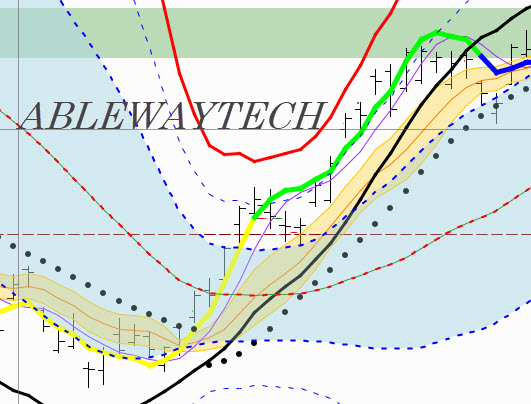Trend following is one of the most powerful practical trading strategies available to you as an individual trader. It is suitable for multiple time frames and multiple markets. In a very real sense, all trading strategies regardless of time frame incorporate some aspect trend following except for purely random entry systems.
Understanding What Contributes to Your Trading Results
Analyzing Trade Results
Analysis of Last Week's Find the Movers trades
The Essence of Relative Strength
The simplest way to assess relative strength is to divide price by price to develop a relationship on the current price and compare that relationship through time. It can be normalized on a scale of 0 to 100 were treated as a raw unbounded number. Normalizing on a scale of 0 to 100 allows for consistency and simplifies the comparison between different instruments against an index or against each other.
How To Find Intraday Trading Targets
Volatility is actually one of the trader’s best friends, because it’s a clear measure that a financial instrument is moving. And isn’t that what we want? To find things that are moving, so we can sell much higher than we bought or vice versa? If a stock isn’t moving, if it doesn’t have volatility, this can be a frustrating endeavor. By finding stocks and ETFs that have a high volatility, what we call ‘finding the mover’, we’re able to be ready for a larger move that we can capitalize on with our trading techniques and proper risk management.
Information Sources for Core Trading
Find the movers 2/24/2023: NKE and TSLA
When using the Owl Bundle on Thinkorswim to identify trade opportunities, we adopt a "Logic chain" approach that involves analyzing sectors and the symbols within them. To do this, we examine the S&P500 sector ETFs and rank them according to Rstat/MyRisk from highest to lowest. In our analysis, XLY, XLK, and XLC emerged as the top three symbols
Adapting to a Dynamic Market
Trade the Way Ted Williams Hit Baseballs
Ten Ways to Find New Edges
If you want to find opportunities in the market that no one else can see, then you must admit to looking at the market in a different way than the herd. In practical terms this can mean doing things like: The minute you stop searching for new ideas and new ways of expressing your edge, is the minute that the pack is gaining on you.
Dual portfolio approach to my Investment Strategy
My investment strategy is a dual portfolio approach, which involves maintaining a long-term, low-risk portfolio for stability and growth, and a separate short-term trading portfolio focused on generating short-term returns. This allows me to balance the security provided by the long-term portfolio with the potential for higher returns from the trading portfolio.
Designing a Robust Trading System
Sensitivity Analysis of Trading Strategies on Thinkorswim
Understanding Average True Ranges ATR
Developing the Daily Trading Plan
Trading the markets on a daily basis with short term strategies places a premium on efficiently and effectively developing a comprehensive daily trading plan. Short term trading can be a very rewarding part of an overall trading and investment strategy. Without a sound and comprehensive plan, though, there are just too many ways to go astray for the novice trader.
Weekly Macro View and Market Analysis Newsletter
KELLY CRITERION Ed Thorp Optimal Position Sizing for Stock Trading
Creativity 202: Wrap up Lesson 30, Ken Long course
Van Tharp Trade Your Way to Financial Freedom - Expectancy in Trading & Position Sizing
Dr Van Tharp (Featured in market wizards) looks at stock trading from a probabilistic perspective, discussing the expectancy value measured in multiples of R and highlighting the importance of position sizing. Dr Tharp says most traders are looking for the holy grail of stock trading within a particular setup, when in reality the way to trade your way to financial freedom is to look within yourself. Managing your risk through position sizing, using the risk reward ratio and controlling your inner self (trading psychology) are keys to your stock trading success. The expectancy value should also be aligned to opportunity, expectancy without opportunity could lead to minimal profits.



















